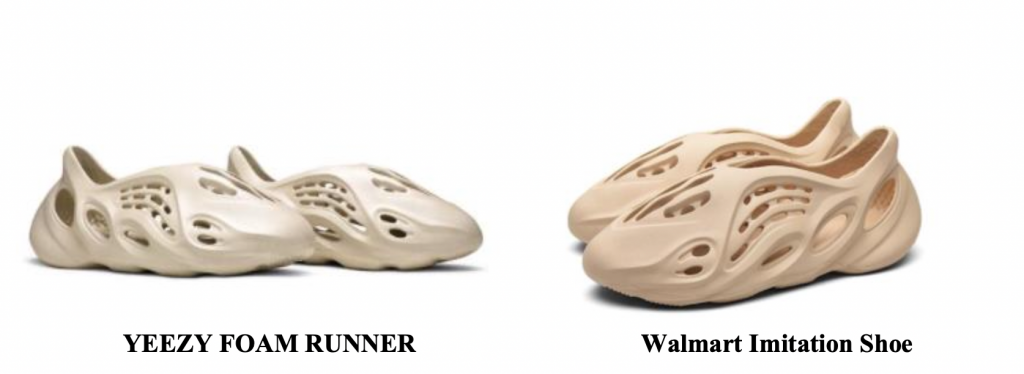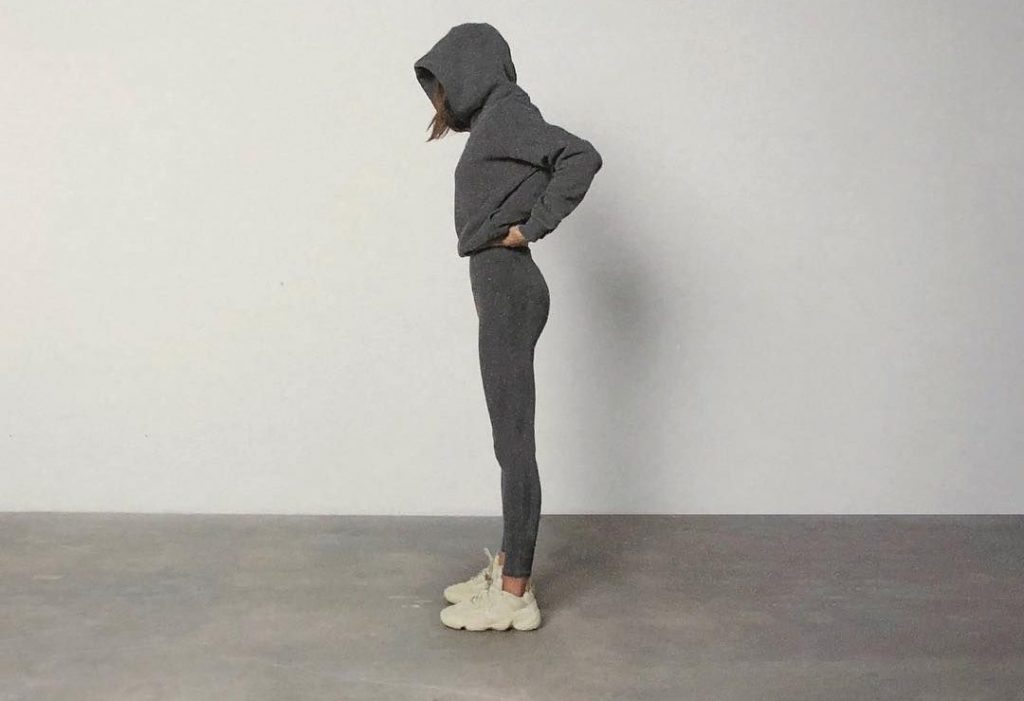Kanye West has escalated his clash with Walmart, which started with a pending trademark battle between his brand and Walmart over their respective logos, by initiating a new unfair competition suit against the retail giant for selling copycat versions of Yeezy’s hot-selling Foam Runner shoes. According to the complaint, which was filed in a California state court on Thursday, West and Yeezy LLC allege that Walmart and a handful of unnamed third-party Walmart sellers (the “defendants”) are “flagrantly trading off of [Kanye] and the Yeezy brand’s popularity by offering for sale an imitation version of the Yeezy Foam Runner,” and confusing consumers in the process.
In the newly-filed complaint, West and Yeezy LLC (the “plaintiffs”) assert that by selling footwear that “imitates … the original and distinctive Yeezy Foam Runner” and that amount to an “unauthorized exact copy of the Yeezy [shoe] in every respect, including the clog-silhouette, foam slip-on body, and characteristic varying-sized cutouts on the sides and top of the shoe,” Walmart and the other defendants are causing significant harm to the “multi-billion dollar” Yeezy brand. In addition to copying the overall look and feel of the product, West and Yeezy claim that the replicas being offered by third-party sellers on Walmart’s site specifically feature the same “three teardrop-shaped cutouts in decreasing size from back to front, from the heel to the middle of the shoe, with three stacked curved lines comprised of wide, short ovals over the smallest teardrop-shaped cutout along the side of the shoe, with two eye-shaped cutouts on the side of the toe, a diamond-shaped pattern of undulating lines with oval cutouts on the top of the shoe, and identically textured bottoms” as the Yeezy shoe.
Aside from the sheer similarity at play between the two designs, West and Yeezy claim that by way of the Walmart-offered footwear, the defendants are intentionally – and successfully – trading on the appeal of and demand for the Yeezy shoes, which is evidenced by comments on Walmart’s website, which “make [it] clear that many consumers purchased the imitation shoe only because of its association with West and the YEEZY brand.” For instance, a number of comments on the since-removed product listings specifically mention “Yeezy” and “Kanye vibez,” while others refer to the footwear as “budget” and “more affordable” versions of the real thing.
At the same time, West and Yeezy point to comments on social media, which reference the “Walmart Yeezy’s” and call attention to the availability of “Foam Runners at Walmart.” These remarks demonstrate that consumers are, in fact, confused about the nature and source of the imitation shoes, the defendants assert, and as a result, that they are associating the lookalike shoes with West and Yeezy even though they have not authorized the manufacture and sale of the shoes, and are not affiliated with them.

With such alleged confusion in mind, and in light of the availability and the cost of the lookalike shoes (i.e., $25 to $30), Kanye and Yeezy claim that “consumers likely would have purchased” Yeezy Foam Runners – which originally retail for $80 – “were it not for the cheaper knock-off imitation shoe.” (This might be something of a far-fetched argument given the fact that West’s footwear offerings notoriously sell out in record times and as a result, tend to only become available to for most consumers by way of the secondary market with price tags that routinely reach into the hundreds of dollars.) Plausibility aide, West and Yeezy claim that “Walmart’s unfair competition has caused [them] to lose market share that they otherwise would have had.” They also assert that the “defendants’ unfair and unlawful conduct has directly … harm[ed] the goodwill of the YEEZY brand,” stemming in part from “the association with the imitation shoe given its subpar quality,” and thus, has “diminish[ed] the value of West’s and Yeezy’s present or future intellectual property interests.”
With the foregoing in mind and given the economic and brand-specific harm that Walmart has allegedly caused West and Yeezy to experience as a result of “diminished sales of the Yeezy Foam Runner, as well as harm to [their] reputation and property in the form of the YEEZY brand,” Yeezy and West have set out a claim of Unfair Competition under the California Business & Profession Code, which prohibits “any unlawful, unfair, or fraudulent business act or practice, or false, deceptive, or misleading advertising.” According to the complaint, Walmart and the unnamed defendants ran afoul of the state law by selling “an imitation version of the popular and distinctive Yeezy Foam Runner, notwithstanding comments by consumers that were or should have been sufficient to alert Walmart to the presence of imitation goods on its website.”
Moreover, “Walmart traded off of the popularity and goodwill of West and the YEEZY brand in marketing, selling, and profiting from the sale of the imitation shoe,” thereby, amounting to behavior that is “immoral, unethical, oppressive, and/or unscrupulous in that it was designed to confuse consumers and profit off of the YEEZY brand’s and Kanye West’s popularity and fame.”
Beyond that, West and Yeezy claim that “by trading off of [their] popularity and goodwill to increase sales of the imitation shoe, without authorization or compensation to the plaintiffs,” Walmart and the other defendants “have unjustly enriched themselves to the detriment of the plaintiffs,” and thus, they set out a claim of quantum meruit in order to regain the profits that were allegedly amassed by the defendants in an unjust manner. Aside from monetary damages, including “restitution or disgorgement of the defendants’ profits,” Yeezy and West are looking for injunctive relief in order to formally bar the defendants from engaging in such conduct going forward.
In a statement in response to news of the filing on Thursday, a representative for Walmart said, “We take allegations like this seriously and are reviewing the claim. We will respond in court as appropriate after we have been served with the complaint.” The rep further asserted that “the product referenced in the complaint is not sold by Walmart, but rather by third party Marketplace sellers.”
The case is Kanye West and Yeezy LLC v. Walmart Inc., et al., 21STCV23514 (Cal.Sup.)











